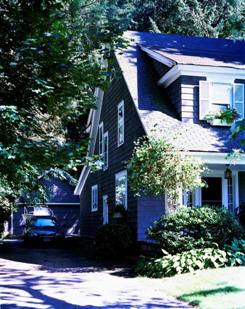Seniors Living Alone - A Checklist for Your Occasional Visits
Your parents are now seniors living alone. You live across the country and don't get back that often to see them. You noticed signs of their aging last time you got together, and now want to really evaluate how they are doing.
Here's how you can make use of visits for holidays, birthdays or other occasions to better evaluate if they need additional support or help. Remember, this is not an inspection for purposes of judgment or criticism. You are doing part wellness check, part well-being check, part safety check.
 |
Since you're not around all the time, and it's difficult to get
thorough information on the phone, you want to use this time to be alert
for signs of significant change or decline. If there's an accident
waiting to happen, maybe you can spot it and see that it's fixed. Perhaps things have been getting more difficult and your parents have been reluctant to tell you. Use this Checklist as a way to use your visit time effectively. |
Be subtle. Don't look like you are checking up on them. Trust your instincts. If something seems wrong probe further. And use what you are noticing as openings for conversations.
"Hey Mom, I noticed you were having trouble reading that paper... What if we change the light bulbs in here? Could we make an appointment to get your eyes checked?"
Offer to do little things around the house without being asked. Sometimes the maintenance list can get overwhelming for seniors living alone, and a quick offer to help will be received gratefully. Don't wait for an explicit "yes or no..." they may be too proud to ask for help. Just let them know that you'd like to use this time to be helpful and supportive.
You still want to socialize and make the visit enjoyable. But you also need to pay attention and listen carefully, and ask questions as needed so that you can stay abreast of current and future needs for seniors living alone.

Get your FREE Guide:
Set The Right T.E.M.P.O.
Submit your name and email to receive this Holiday Guide -- for free. You can get instant help to improve your family time with aging or ill loved ones during the holidays .

Rev. Dale Susan
Start when you drive up to the house
Get a general impression of how the outside looks.
- Check the house -- paint, trim, look at windows and doors for signs of needed maintenance or repair
- Summer: Is the yard neat: grass mowed, flower beds vibrant and weeded, shrubs trimmed, litter picked up
- Fall: Leaves rakes, branches picked up
- Winter: Sidewalks and porches and steps shoveled. Is a bucket of salt accessible to coat porches and steps without walking on them first? Are shovels nearby? Check how heavy it is and replace with a gift of a light-weight one if needed. Snow and ice are a particular danger for seniors living alone, so evaluate carefully.
- Any noticeable change from the way the yard was kept in the past?
When greeting Mom and Dad
- How do they look? Noticeably heavier or thinner? Has their general appearance changed in unexpected ways?
- Walking upright or more stooped? Pace of their movements or actions significantly changed? How steady do they seem on stairs?
- Has Dad always been clean shaven and now has significant stubble?
- Has Mom's hair always been immaculate and now is unruly all day?
- Is there a change in their clothing? Things rumpled when they use to be very neat. Spots or rips or buttons miss? Clothing more mismatched that used to be carefully coordinated? Significant body odor when that "fresh detergent smell" was what they prided themselves on?
- Are they using reading glasses or hearing aids when they need to? Any signs of trouble reading? Does Dad continue to ask you to repeat yourself, or continue to give inappropriate answers to questions?
In the Living Room
- Are there things that have changed beyond general wear and tear? Note the general cleanliness. Is there a significant change from the way it's been kept in the past?
- Check the floors for safety hazards. That rumpled throw rug now puts your seniors living alone at risk for falling.
- Are stairs well lit and carpet coverings tight or wood not slippery? Are steps free from clutter or objects to trip on?
- Are there piles of newspaper or magazines that weren't there before?
In the Kitchen
- Spend time there with your parents and alone. Notice how they move
around the kitchen. Are things on the floor that could be tripping
hazards?
- Are things they use regularly stored where
they can be easily reached? Are they climbing when they shouldn't be,
or needing to stoop down if that is difficult?
- Is the
kitchen well lit so labels can be read easily? Do your seniors living
alone now have trouble reading labels and need a magnifying glass handy?
(Or an eye exam?)
- When alone, check out the fridge.
Look for it to be stocked with things that could easily provide a
healthy meal. Does anything have signs of mold? Check the dates on salad
dressings, etc. Look at the butter for signs that it has gone bad.
- Look in the cabinets and check dates of spices, mixes, cereals, etc. Make sure canned goods have not gone bad.
- Can your parents open jars and cans easily, or could you give new openers that fit the hands and needs of seniors living alone?
- Offer to rearrange a cabinet so that things are grouped together and can be easily found, or won't spill out on them.
In the Bathroom
- Check for signs of new health conditions or expanded medications. Are there more prescription drugs than you've noticed in the past? Are there more over-the-counter drugs than you've noticed in the past?
- Check dates on medications so that no expired medications could be
taken accidentally. If there are expired meds -- does that mean that a
prescription was not taken fully?
- Notice how your
parents take their meds. Do they have a system for organizing them daily
so they are not over or under medicating? Is there an easy way of
distinguishing whose pills are whose? (Different shelves, different
colored pill boxes, etc.)
- How do they keep track of dosages and when pills have been taken?
- Do they have a list of all medications that they can take to doctor's
visits with them? If they have meds from multiple doctors, has this
entire list been evaluated for possible drug interactions? Managing
medications can be a serious challenge for seniors living alone.
- Are mats in place to prevent slipping in the bathtub? Are railings and handles secure? Check the water faucets and hot water temperature so scalding is not a danger.
In the Office or Desk Area
- Are you finding lots of unopened mail? Are there signs that bills have been opened and paid?
- Is there any visible system for organizing their records? (It doesn't
have to match yours... there just needs to be a system that's workable
for them.)
- Are insurance records in a place that they could be managed as health care needs increase?
- Is there cash lying around in amounts that would be unusual?
- Is the checkbook reasonably up to date and accurate?
In the Closets
- Are things organized so they can be found and retrieved easily, or is there a potential accident here?
- Is there an easily accessible and safe path in and out of the closet?
Have they stored things they need too high up or too far back or too far
down to reach them safely? Seniors living alone can be tempted to try
risky maneuvers.
- Have lots of extra papers or magazines
or other things been shoved in? Is there a fire hazard here? Are the
papers and magazines now too heavy to dispose of the way that they have
in the past? Has their eyesight changed so that they have vowed to "get around to reading them later..."
- Any signs of changed shopping habits ... lots more things with tags
still on? Lots of boxes or packages that haven't been opened?
In the Bedroom
- Is the bed unmade every day when they used to be neat freaks? Have
the sheets been changed, or is this potentially too difficult?
- Are their clothes disorganized or piled in significantly different ways?
In the Laundry Room
- Is the washer and dryer easily accessible? Can they transport clothes in and out of this area with little difficulty?
- Are cleansers and bleaches stored in places that are easy to reach?
Are they in containers that are not too heavy to carry, lift and pour
for seniors living alone?
- Are materials available to manage spills within reach (without having to walk across slippery floors)?
In the Garage
- Check how things are stored. Are flammables safely away from things that could catch fire?
- Can your seniors living alone easily move around and retrieve the items they need?
- Are tools in good repair and appropriate to your parents' physical condition?
- How does the car look? Any change in how it's been maintained?
- Go for a ride and check out their driving. Speed, turns, awareness of
road signs, hazards and other drivers. Even if there are no challenges,
it's time to begin
The Driving Conversations.
Check Out the Technology
- Did they get a new television but don't know how to program their
favorite shows? Nothing can be more frustrating for seniors living alone
than not being able to keep up with the things they enjoy.
- Do they no longer take pictures because a camera is broken, or they are intimidated to get a new one?
- Do they have a cell phone? Know how to use one for emergencies? Do they know how to program numbers or retrieve messages?
- Do they use a computer or would like to learn? Check for antivirus updates and make sure they are aware of the latest "phishing" scams.
To Holidays with Aging Parents
To Senior Housing Decisions
From Seniors Living Alone to Aging Parents Home Page



